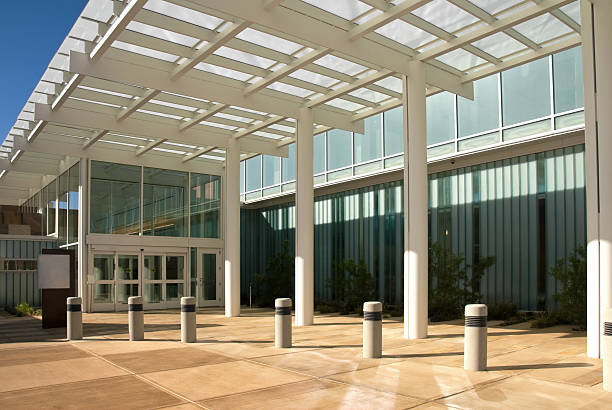Going Green with Metal Awnings: Sustainable Solutions for Commercial Buildings
In an era where sustainability is at the forefront of societal and business concerns, commercial buildings are increasingly seeking eco-friendly solutions to reduce their environmental footprint while enhancing their functionality and aesthetics. One such solution gaining popularity is the utilization of metal awnings. These versatile structures not only offer shade and protection but also provide a sustainable option for commercial buildings looking to adopt greener practices. In this article, we’ll explore how metal awnings contribute to sustainability and why they are becoming preferred choices for eco-conscious businesses.
Reducing Energy Consumption
One of the primary ways metal awnings promote sustainability is by reducing energy consumption within commercial buildings. By providing shade and blocking direct sunlight, awnings help mitigate solar heat gain, thereby reducing the need for excessive air conditioning during hot summer months. This results in lower energy usage and decreased reliance on mechanical cooling systems, leading to significant cost savings for businesses while also reducing their carbon footprint. Additionally, by minimizing indoor temperature fluctuations, awnings create a more comfortable and energy-efficient environment for occupants, enhancing overall occupant satisfaction and productivity.
Improving Indoor Comfort
Metal awnings not only help regulate indoor temperatures but also contribute to improved indoor comfort for building occupants. By creating shaded outdoor areas, awnings extend usable spaces for relaxation, dining, or socializing, allowing occupants to enjoy the benefits of fresh air and natural light without being exposed to harsh sunlight or inclement weather. This not only enhances the overall occupant experience but also promotes a healthier and more enjoyable work or leisure environment. Additionally, by reducing glare and minimizing UV exposure, awnings help protect indoor furnishings, equipment, and finishes from sun damage, prolonging their lifespan and reducing the need for premature replacement.
Enhancing Durability and Longevity
Metal awnings are known for their durability and longevity, making them a sustainable choice for commercial buildings seeking to minimize waste and resource consumption over time. Constructed from high-quality materials such as aluminum or steel, awnings are resistant to corrosion, rust, and degradation, ensuring they maintain their structural integrity and aesthetic appeal even in harsh environmental conditions. Unlike traditional fabric awnings that may deteriorate over time and require frequent replacement, awnings offer a long-term shade solution that requires minimal maintenance and upkeep, reducing the generation of waste and conserving valuable resources.
Promoting Rainwater Harvesting
Metal awnings can also play a role in promoting rainwater harvesting and conservation efforts for commercial buildings. By strategically positioning awnings over outdoor gathering areas, walkways, or entry points, businesses can collect rainwater runoff and channel it into storage tanks or rain barrels for reuse in irrigation, landscaping, or non-potable water applications. This not only helps conserve precious freshwater resources but also reduces stormwater runoff and alleviates pressure on municipal drainage systems, mitigating the risk of urban flooding and erosion. Additionally, by integrating rainwater harvesting with our awnings, businesses can demonstrate their commitment to sustainable water management practices and environmental stewardship.
Facilitating Solar Integration
Metal awnings provide an ideal platform for the integration of solar panels, further enhancing their sustainability credentials and energy-saving potential for commercial buildings. By mounting solar panels onto metal awnings, businesses can harness clean and renewable solar energy to power lighting, heating, cooling, or other electrical systems within their facilities. This not only reduces reliance on fossil fuels and grid-based electricity but also generates cost savings through lower utility bills and potential incentives or rebates for renewable energy installations. Additionally, by incorporating solar panels into awnings, businesses can take advantage of underutilized rooftop or outdoor spaces, maximizing the efficiency and effectiveness of their solar energy systems.
Conclusion
In conclusion, metal awnings offer sustainable solutions for commercial buildings seeking to reduce their environmental impact while enhancing their functionality and aesthetics. From reducing energy consumption and improving indoor comfort to promoting rainwater harvesting and facilitating solar integration, metal awnings provide numerous benefits that align with the principles of sustainability and green building practices. By investing in metal awnings, businesses can demonstrate their commitment to environmental responsibility, enhance their operational efficiency, and create healthier and more sustainable environments for occupants. With their durability, versatility, and eco-friendly attributes, metal awnings are a smart choice for businesses looking to go green and make a positive impact on the planet.

